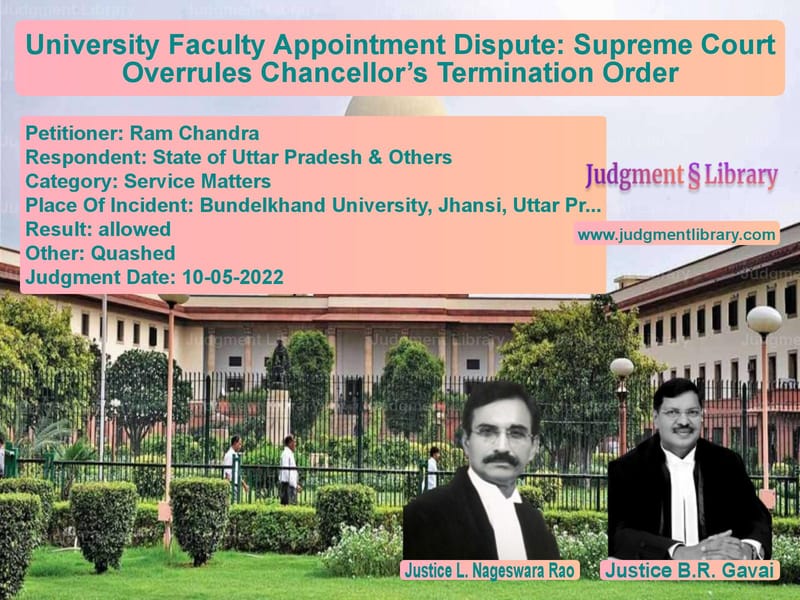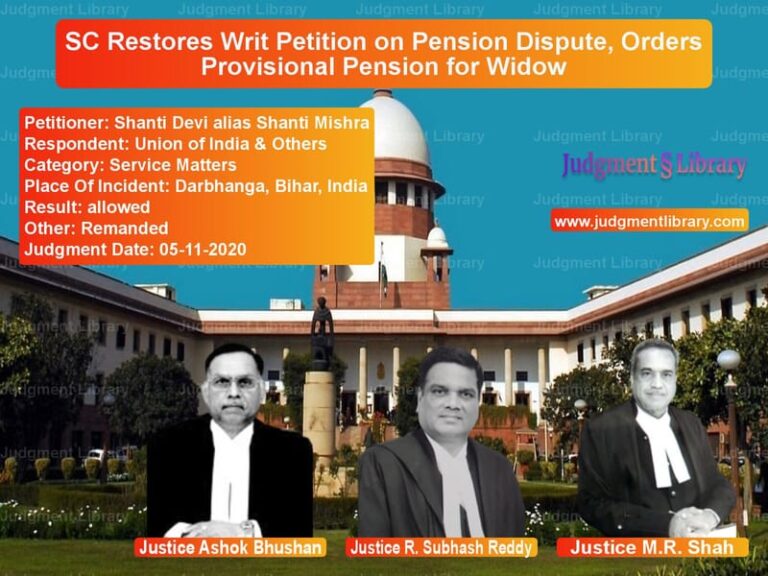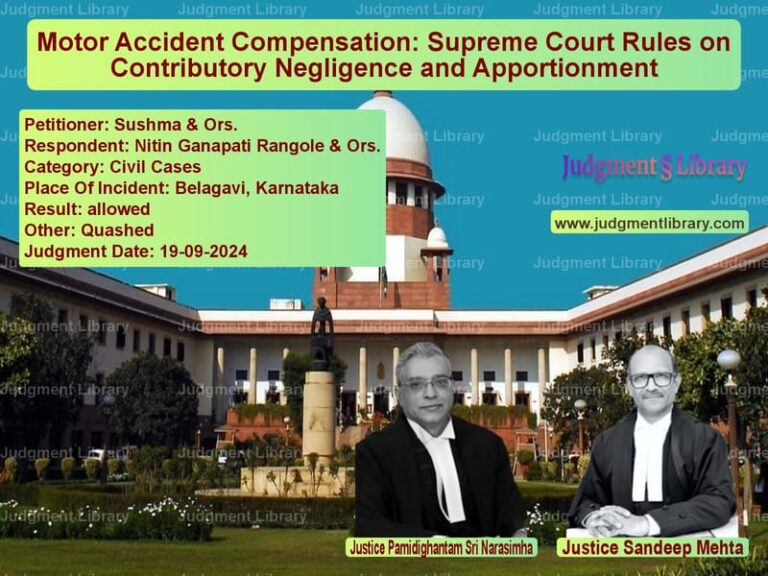University Faculty Appointment Dispute: Supreme Court Overrules Chancellor’s Termination Order
The Supreme Court of India recently delivered a landmark judgment in Ram Chandra vs. State of Uttar Pradesh & Others, concerning the legality of a faculty appointment at Bundelkhand University, Jhansi. The case revolved around the termination of a lecturer’s service, nearly twelve years after his appointment, based on allegations that the selection process was flawed. The Supreme Court set aside the termination, ruling that procedural lapses by the university could not be used to invalidate an appointment where the candidate had already served for over a decade.
Background of the Case
The appellant, Ram Chandra, was appointed as a Lecturer in Geology at Bundelkhand University in 2002 through a selection process conducted under the Uttar Pradesh State Universities Act, 1973. Later, he was promoted to the post of Reader based on the university’s recommendations. However, in 2014, following complaints, the Chancellor initiated a suo motu inquiry under Section 68 of the Act, finding that the selection committee had not been properly constituted. The Chancellor directed the university to annul the appointment, leading to the appellant’s termination.
Aggrieved, the appellant challenged the termination order before the Allahabad High Court, which upheld the Chancellor’s decision. He then appealed to the Supreme Court.
Arguments of the Appellant (Ram Chandra)
- The appellant argued that he had been appointed through a duly advertised selection process and had served for over a decade.
- The university had followed all necessary procedures at the time of appointment, and any administrative lapses should not be held against him.
- The Chancellor’s decision was arbitrary, as no findings questioned his eligibility or qualifications.
- The High Court erred in dismissing the writ petition without considering that the termination violated his fundamental right to livelihood under Article 21.
Arguments of the Respondents (State of Uttar Pradesh & Bundelkhand University)
- The respondents contended that the selection committee that appointed the appellant was not properly constituted, rendering the appointment illegal.
- Section 31 of the Uttar Pradesh State Universities Act, 1973 mandated that the Chancellor nominate experts for the selection panel, which was not done.
- Since the procedural defect affected the legitimacy of the appointment, the Chancellor had the power to annul it under Section 68.
- The High Court correctly upheld the termination, as an appointment made in violation of statutory provisions could not be sustained.
Supreme Court’s Observations
The Supreme Court examined the provisions of the Uttar Pradesh State Universities Act and previous judgments to determine whether the termination was legally justified. The Court made the following key observations:
Read also: https://judgmentlibrary.com/bihar-2-lecturers-merger-with-bes-supreme-court-verdict-explained/
- The selection committee that appointed the appellant included two subject experts who had been nominated by the Chancellor in 2001, even though the university had not sought fresh nominations in 2002.
- While procedural errors in the constitution of the selection committee were acknowledged, they did not render the appointment void, especially since the appellant had served for twelve years without objection.
- The Court emphasized that the appellant had not committed any fraud or misrepresentation in securing the job.
- The Chancellor’s decision to annul the appointment after such a long period violated the principles of fairness and proportionality.
The Court cited its ruling in Shiv Kumar vs. State of Haryana, observing:
“Where an employee has served for a long period and has not committed any wrongdoing, a technical defect in the appointment process cannot be used to terminate services retrospectively.”
Judgment and Directions
The Supreme Court ruled:
- The Chancellor’s order dated March 3, 2014, and the subsequent termination order issued by the university on March 7, 2014, were quashed.
- The High Court’s judgment dated March 25, 2014, upholding the termination, was set aside.
- Since the appellant had superannuated during the pendency of the appeal, the Court directed that he be treated as having remained in service until retirement.
- The university was ordered to release all terminal benefits, including pension and gratuity, within three months.
- The appellant was directed to vacate the university accommodation within three months.
Key Takeaways from the Judgment
- Procedural lapses by an employer cannot be used to punish an employee: If a candidate has been appointed through a formal process and has served for a long period, minor procedural errors should not justify termination.
- Judicial review of administrative decisions: The Court reaffirmed that actions taken by the Chancellor and university must be reasonable and proportionate.
- Protection of employee rights: The judgment strengthens job security for employees who are unfairly removed due to administrative oversights.
- Compensation instead of reinstatement: Since the appellant had already retired, the Court opted for monetary relief rather than reinstatement.
Conclusion
The Supreme Court’s ruling in Ram Chandra vs. State of Uttar Pradesh provides critical guidance on university faculty appointments and the discretionary power of chancellors. The judgment ensures that long-serving employees are not arbitrarily dismissed due to procedural errors beyond their control. By restoring the appellant’s service benefits, the Court reinforced the principles of fairness and proportionality in employment law.
Petitioner Name: Ram Chandra.Respondent Name: State of Uttar Pradesh & Others.Judgment By: Justice L. Nageswara Rao, Justice B.R. Gavai.Place Of Incident: Bundelkhand University, Jhansi, Uttar Pradesh.Judgment Date: 10-05-2022.
Don’t miss out on the full details! Download the complete judgment in PDF format below and gain valuable insights instantly!
Download Judgment: ram-chandra-vs-state-of-uttar-prade-supreme-court-of-india-judgment-dated-10-05-2022.pdf
Directly Download Judgment: Directly download this Judgment
See all petitions in Employment Disputes
See all petitions in Termination Cases
See all petitions in Judgment by L. Nageswara Rao
See all petitions in Judgment by B R Gavai
See all petitions in allowed
See all petitions in Quashed
See all petitions in supreme court of India judgments May 2022
See all petitions in 2022 judgments
See all posts in Service Matters Category
See all allowed petitions in Service Matters Category
See all Dismissed petitions in Service Matters Category
See all partially allowed petitions in Service Matters Category







